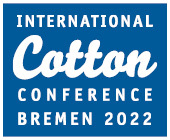 Traceability and transparency initiatives throughout the cotton value chain and within the textile industry gain importance. During the International Cotton Conference Bremen 2022 selected speakers presented their projects with different technological backgrounds and perspectives in this field.
Traceability and transparency initiatives throughout the cotton value chain and within the textile industry gain importance. During the International Cotton Conference Bremen 2022 selected speakers presented their projects with different technological backgrounds and perspectives in this field.
Traceable Uzbek Cotton
Rinat Gulyaev, Director, Cotton Science-Innovation Center, Uzbekistan spoke about the development of an electronic traceability system for cotton products in the Uzbek cotton supply chain. Mr. Gulyaev said that Uzbekistan now processes domestically 100 percent of the cotton grown and 45 percent of the yarn is produced in Uzbekistan. Textile exports were valued at $3.1 billion in 2021, and Uzbekistan hopes to raise production of textiles, knitwear and garments to $15 billion by 2025.
Transparency and traceability were important measures for increasing exports to the European Union and the United States. However, farm-level data on cotton production and ginning, and textile mill data on greige goods production is lacking. He said that it would be possible to provide farm-level data for cotton produced in Uzbekistan using permanent bale identification tags with barcodes or RFID technology.
Therefore, Uzbekistan has embarked on a project in the Bukhara region involving nearly 68,000 farmers and 226,000 hectares of various crops, including 98,000 hectares of cotton, to develop a specialized system of data collection for integration into international traceability systems. The aim of the project is to inform consumers of finished products about the entire production chain, including origin, composition, quality, and compliance with social and environmental standards. A nationwide adoption is planned in one or two years.
Presentation of Mr Rinat Gulyaev on the website of the Bremen Cotton Exchange (pdf)
Value Added US Cotton
Ms. Mariam Paris, Head of Americas CE & Mkt, Veg Seeds, Bayer Crop Science, Munich, Germany, spoke about the Fiber Quality Initiative by Deltapine. This is a pilot to showcase traceability and sustainability in U.S. grown Deltapine™ or Deltapine Select™ varieties. Ms. Paris also observed that the importance of fibre origin is rising, and there is greater interest in domestic manufacturing. Therefore, Deltapine has developed a partnership strategy to educate retailers and consumers on the virtues of cotton, to address sustainability, traceability and quality challenges the textile industry faces, and to provide financial benefits to Deltapine growers for helping to solve these challenges.
The Fiber Quality Initiative Pilot Program with medical scrubs made of 100 percent US-grown Deltapine cotton was started in 2020. The scrubs were treated with an antimicrobial technology, PROTX2 AV. Every aspect of the project, from seed breeding to cut and sew, was done in the United States, and participants were registered with the United States Cotton Trust Protocol, ensuring traceability. Scrub sets were donated to staff in 15 hospitals in August 2021, and commercialization efforts were launched with private suppliers of medical equipment.
Distributed Ledger Technologies for the Textile and Clothing Industry
Ms. Gesine Köppe, Project Manager, ITA Academy GmbH, Aachen, Germany spoke about Distributed Ledger Technologies in textile value chains. The complex infrastructure and multiple individual actors pose a challenge for transparency and traceability in the value chain. Most supply chain software requires energy and time to input and manage data. The objective is to ensure supply chain transparency within a global network using Distributed Ledger Technologies (DLT).
Ms. Köppe explained that a DLT is a decentralized database that allows participants in a network to share ledgers and maintain read and write access. Blockchain is a well-known technology in which a network is decentralized. Transactions are validated and ledger copies are stored. A blockchain has a redundant structure and ensures immutability and is tamper-proof. The textile value chain can benefit from the use of DLT.
The TexCHAINge Task Force on Digital Supply Chain Management aims to enable German textile and clothing companies to overcome the challenges of structural change through digitization in supply chain management. Participants include evan GmbH, Ernstings Family GmbH, KiK Textilien und Non-Food GmbH, ITA Academy GmbH, Bremer Baumwollbörse, Peek & Cloppenburg, and consider it. Ms. Köppe acknowledge that adoption of blockchain technology is difficult, and ITA Academy has set up a Digital Capability Center to enable potential users to envision the integration of DLT with manufacturing processes.
Presentation of Ms Gesine Köppe on the website of the Bremen Cotton Exchange (pdf)
Find all presentations on the website of the Bremen Cotton Exchange: PRESENTATIONS OF THE INTERNATIONAL COTTON CONFERENCE BREMEN
Participants of the conference are still able to watch the recordings of the sessions with their login for the online platform

